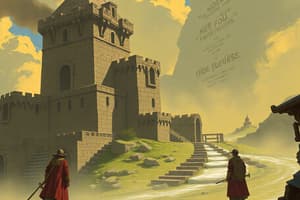Podcast
Questions and Answers
इतिहास का अध्ययन किसके बारे में होता है?
इतिहास का अध्ययन किसके बारे में होता है?
- भविष्य की घटनाएँ
- वर्तमान सामाजिक संरचनाएँ
- केवल व्यक्तियों के जीवन
- भूतकाल में घटित घटनाएँ (correct)
इतिहासकारों द्वारा उपयोग किए जाने वाले प्राथमिक और द्वितीयक स्रोतों का मुख्य उद्देश्य क्या है?
इतिहासकारों द्वारा उपयोग किए जाने वाले प्राथमिक और द्वितीयक स्रोतों का मुख्य उद्देश्य क्या है?
- तर्कशीलता को कम करना
- समाज का अध्ययन करना
- पिछली घटनाओं का पुनर्निर्माण और विश्लेषण करना (correct)
- वर्तमान के लिए निर्णय लेना
किस ऐतिहासिक अवधि को पश्चिमी इतिहास में महत्वपूर्ण माना जाता है?
किस ऐतिहासिक अवधि को पश्चिमी इतिहास में महत्वपूर्ण माना जाता है?
- प्राचीन काल (correct)
- आधुनिक और समकालीन इतिहास
- कालीन इतिहास
- मीडिल इतिहास
इतिहास में संदर्भिकरण का क्या महत्व है?
इतिहास में संदर्भिकरण का क्या महत्व है?
कौन सी अवधि अन्वेषण और वैज्ञानिक क्रांति पर केंद्रित है?
कौन सी अवधि अन्वेषण और वैज्ञानिक क्रांति पर केंद्रित है?
इतिहास पढ़ने का एक महत्वपूर्ण लाभ क्या है?
इतिहास पढ़ने का एक महत्वपूर्ण लाभ क्या है?
इतिहास में अंतःविषय दृष्टिकोण का क्या महत्व है?
इतिहास में अंतःविषय दृष्टिकोण का क्या महत्व है?
कौन सी घटना मीडिल इतिहास का एक महत्वपूर्ण विषय है?
कौन सी घटना मीडिल इतिहास का एक महत्वपूर्ण विषय है?
Flashcards
इतिहास क्या है?
इतिहास क्या है?
इतिहास मानवीय घटनाओं, विशेष रूप से अतीत की घटनाओं का अध्ययन है।
इतिहासकार कैसे काम करते हैं?
इतिहासकार कैसे काम करते हैं?
इतिहासकार प्रमाणों का मूल्यांकन और व्याख्या करने के लिए विभिन्न तरीकों का प्रयोग करते हैं।
इतिहास का महत्व क्या है?
इतिहास का महत्व क्या है?
इतिहास वर्तमान चुनौतियों और समाज संरचनाओं में मूल्यवान अंतर्दृष्टि प्रदान करता है।
प्राचीन सभ्यताएँ
प्राचीन सभ्यताएँ
Signup and view all the flashcards
ऐतिहासिक विधियाँ
ऐतिहासिक विधियाँ
Signup and view all the flashcards
मध्यकालीन इतिहास
मध्यकालीन इतिहास
Signup and view all the flashcards
ऐतिहासिक कालखंड
ऐतिहासिक कालखंड
Signup and view all the flashcards
विभिन्न स्रोतों से इतिहास
विभिन्न स्रोतों से इतिहास
Signup and view all the flashcards
Study Notes
Overview of History
- History is the study of past events, particularly in human affairs.
- It encompasses a wide range of subjects, from individual lives to global conflicts.
- Historians utilize primary and secondary sources to reconstruct and analyze past events.
- Historical narratives are often shaped by the perspectives and biases of the historians themselves.
Historical Methods
- Historians employ various methodologies to evaluate and interpret evidence.
- Critical analysis of sources is essential to determine their authenticity and reliability.
- Contextualization of events is crucial to understanding their significance within the broader historical framework.
- Historians often interpret and analyze patterns, trends, and causal relationships in historical data.
- Interdisciplinary approaches, incorporating insights from other fields like archaeology and sociology, enrich historical understanding.
Major Historical Periods
- The pre-historic period, spanning from the earliest human ancestors to the development of writing systems, involves investigation through archaeology.
- Ancient civilizations, such as those in Mesopotamia, Egypt, Greece, and Rome, are examined.
- Major developments, such as the invention of writing, agriculture, and city-states, are studied.
- The classical period is a pivotal epoch in Western history, characterized by the rise and fall of empires and by major philosophical and artistic movements.
- Medieval history encompasses the period from the fall of the Roman Empire to the Renaissance and features themes of religious institutions, feudalism, and the Crusades.
- Early Modern history is focused around exploration, the Renaissance, colonization, the Scientific Revolution, Reformation, and the Age of Enlightenment.
- Modern and contemporary history ranges from the Industrial Revolution onward, including topics like World Wars, globalization, and technological advancements.
- Understanding these different historical periods promotes a broader comprehension of human societies and their evolution.
Importance of Studying History
- History provides valuable insights into present-day challenges and societal structures, offering a crucial framework for understanding the roots of contemporary issues.
- Studying history helps us to evaluate past actions and decisions, ultimately gaining insight into the successes and failures of past societies and guiding actions in the future.
- By analyzing past events, we can develop a deeper understanding of different cultures and perspectives, fostering empathy and tolerance.
- History challenges us to think critically about different interpretations and biases present in any account of the past.
- Studying history encourages us towards careful analysis and understanding of the complexity of human interactions and events.
Studying That Suits You
Use AI to generate personalized quizzes and flashcards to suit your learning preferences.




